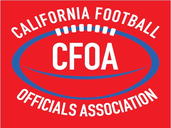Most officials see teams more than once a season. The more times you see a team, the more information you can gather and use. Whether it’s a type of offense a team runs (such as the Spread offence, Pro-set, Double tights, etc.) or a trick play such as a reverse on a kickoff, a little foreknowledge goes a long way. Every game is a history lesson on the gridiron.
Teams have tendencies – strategies, formations and plays they employ in certain situations. For instance, some teams are ‘right-handed’, meaning they run behind the right side (tackle) on running plays or short-yardage downs. While it would be risky to focus all of your attention on the tackle on such a play, casting your initial glance in that direction gives you’re a bit of an advantage in officiating the play. In the days leading up to a game involving a team that passes the vast majority of the time, a back judge in particular and all officials in general should review the mechanics and rules revolving around pass plays.
History also refers to previous games between the two teams. Perhaps there was an altercation between the teams the last time they played, a huge rivalry game, they don’t like each other, or the one team is seeking ‘revenge’ from last year, in getting knocked out of playoff consideration because of a loss to the other team. You must still officiate the game with a ‘clean slate’ attitude, but such information should help you recognize potential problems before they arise.
That sort of information should be exchanged during the local Association meetings. Our crew has the Burroughs/Burbank game this week. Has anyone had either of the teams this year? If anyone has the Downey/Warren game this Friday, I can tell you why the papers and internet are full of ‘revenge’ stories. We had that game last year. Don’t embellish the stories or offer an alibi as to why your crew may have handled a situation as well as you’d have liked.

